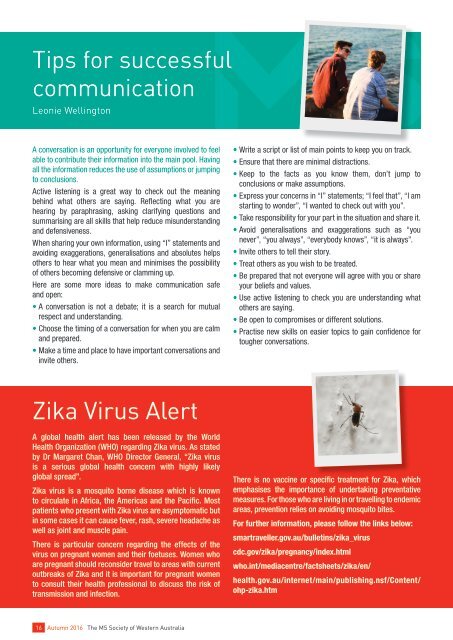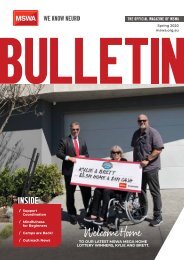You also want an ePaper? Increase the reach of your titles
YUMPU automatically turns print PDFs into web optimized ePapers that Google loves.
Tips for successful<br />
communication<br />
Leonie Wellington<br />
Shaping your<br />
own destiny<br />
Dr Andrew Ong<br />
A conversation is an opportunity for everyone involved to feel<br />
able to contribute their information into the main pool. Having<br />
all the information reduces the use of assumptions or jumping<br />
to conclusions.<br />
Active listening is a great way to check out the meaning<br />
behind what others are saying. Reflecting what you are<br />
hearing by paraphrasing, asking clarifying questions and<br />
summarising are all skills that help reduce misunderstanding<br />
and defensiveness.<br />
When sharing your own information, using “I” statements and<br />
avoiding exaggerations, generalisations and absolutes helps<br />
others to hear what you mean and minimises the possibility<br />
of others becoming defensive or clamming up.<br />
Here are some more ideas to make communication safe<br />
and open:<br />
• A conversation is not a debate; it is a search for mutual<br />
respect and understanding.<br />
• Choose the timing of a conversation for when you are calm<br />
and prepared.<br />
• Make a time and place to have important conversations and<br />
invite others.<br />
• Write a script or list of main points to keep you on track.<br />
• Ensure that there are minimal distractions.<br />
• Keep to the facts as you know them, don’t jump to<br />
conclusions or make assumptions.<br />
• Express your concerns in “I” statements; “I feel that”, “I am<br />
starting to wonder”, “I wanted to check out with you”.<br />
• Take responsibility for your part in the situation and share it.<br />
• Avoid generalisations and exaggerations such as “you<br />
never”, “you always”, “everybody knows”, “it is always”.<br />
• Invite others to tell their story.<br />
• Treat others as you wish to be treated.<br />
• Be prepared that not everyone will agree with you or share<br />
your beliefs and values.<br />
• Use active listening to check you are understanding what<br />
others are saying.<br />
• Be open to compromises or different solutions.<br />
• Practise new skills on easier topics to gain confidence for<br />
tougher conversations.<br />
“We see a universe marvellously arranged, obeying certain<br />
laws, but we understand the laws only dimly. Our limited<br />
minds cannot grasp the mysterious force that sways the<br />
constellations.” Albert Einstein, 1930.<br />
The most powerful way to shape our lives is to first make the<br />
decision to take action. The results that people produce from<br />
this mind-shaping exercise rest on that decision. Each of us<br />
will make different decisions and our different actions as a<br />
result of this will take us in a definite direction, leading us to<br />
an ultimate destination — our particular destiny.<br />
Making this positive decision in the first place means that<br />
we are no longer the creature of circumstances, instead we<br />
have made circumstances the creatures of men and women.<br />
So if we want to direct our lives we must take control of our<br />
actions, and then follow through by being consistent about it.<br />
What then precedes all our actions? What determines what<br />
we do and what we will become? What is it that gives birth<br />
to all actions? The answer to each of these questions is the<br />
decisions we make. You begin to shape your destiny the<br />
moment you make that decision.<br />
A different decision will radically change your life for better or<br />
for worse. It is your decision however, not the condition of your<br />
life that will determine your destiny. Your destiny is therefore in<br />
your hands and shaped by the decisions you make.<br />
The history books are full of people like Einstein, Gandhi, and<br />
the deafblind Helen Keller who, against all odds, have broken<br />
through impossible barriers to move on and beyond the<br />
limitations of their circumstances by making new decisions<br />
about what to do with their lives. They become our shining<br />
examples of the unlimited power of the human spirit.<br />
“The best and most beautiful things in the world cannot be<br />
seen or even touched – they must be felt with the heart.”<br />
Helen Keller<br />
SUNDAY, 1 MAY 20<strong>16</strong><br />
Zika Virus Alert<br />
A global health alert has been released by the World<br />
Health Organization (WHO) regarding Zika virus. As stated<br />
by Dr Margaret Chan, WHO Director General, “Zika virus<br />
is a serious global health concern with highly likely<br />
global spread”.<br />
Zika virus is a mosquito borne disease which is known<br />
to circulate in Africa, the Americas and the Pacific. Most<br />
patients who present with Zika virus are asymptomatic but<br />
in some cases it can cause fever, rash, severe headache as<br />
well as joint and muscle pain.<br />
There is particular concern regarding the effects of the<br />
virus on pregnant women and their foetuses. Women who<br />
are pregnant should reconsider travel to areas with current<br />
outbreaks of Zika and it is important for pregnant women<br />
to consult their health professional to discuss the risk of<br />
transmission and infection.<br />
There is no vaccine or specific treatment for Zika, which<br />
emphasises the importance of undertaking preventative<br />
measures. For those who are living in or travelling to endemic<br />
areas, prevention relies on avoiding mosquito bites.<br />
For further information, please follow the links below:<br />
smartraveller.gov.au/bulletins/zika_virus<br />
cdc.gov/zika/pregnancy/index.html<br />
who.int/mediacentre/factsheets/zika/en/<br />
health.gov.au/internet/main/publishing.nsf/Content/<br />
ohp-zika.htm<br />
Join this unique event and feel the reward and exhilaration of climbing 53 flights<br />
or 1,103 stairs to the top of Perth’s tallest building Central Park, whilst knowing<br />
you have helped make a difference to the thousands of Western Australians living<br />
with multiple sclerosis (MS) and other neurological conditions.<br />
REGISTER NOW AT WWW.STEPUPFORMS.ORG.AU<br />
<strong>16</strong> <strong>Autumn</strong> 20<strong>16</strong> The MS Society of Western Australia The MS Society of Western Australia <strong>Autumn</strong> 20<strong>16</strong> 17


















